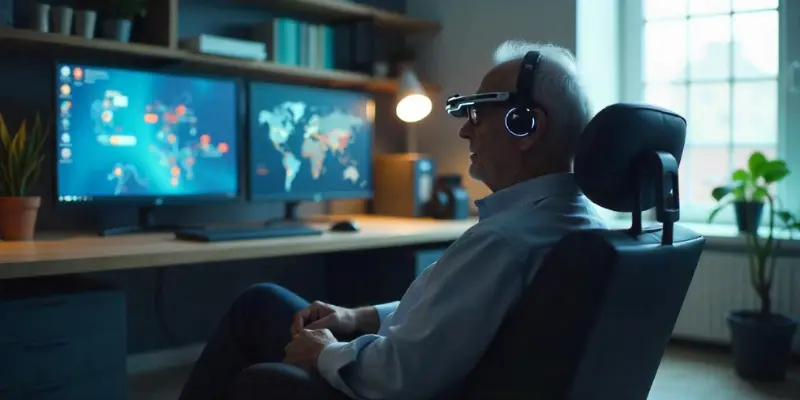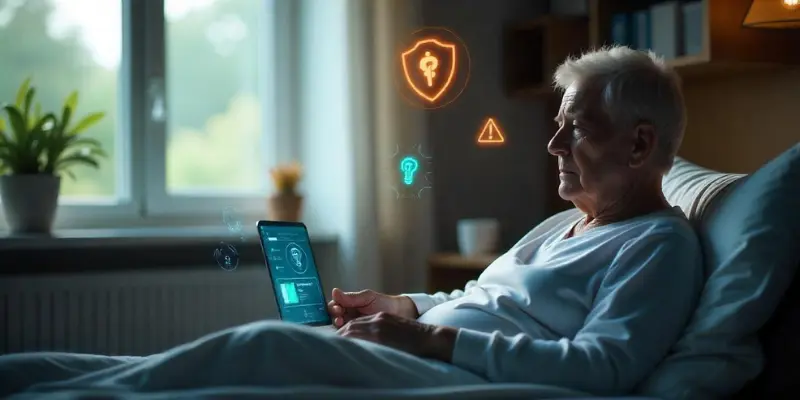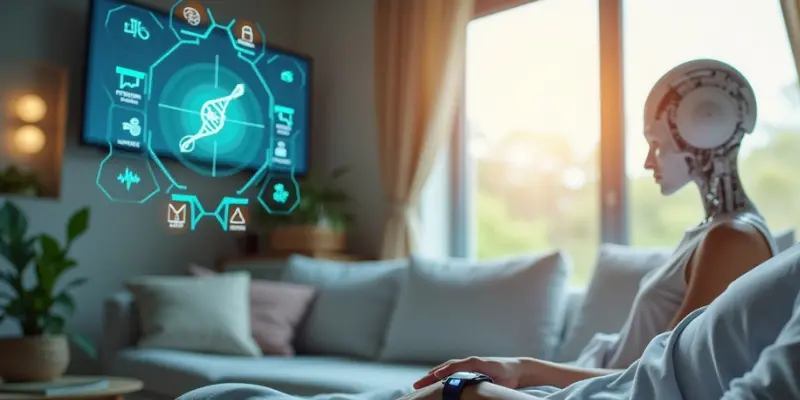AI in Home Healthcare: Smarter, Faster and More Efficient Care
Published: 21 Feb 2025
Did you know? Over 80% of older adults prefer to age at home but only a fraction get the care they need there.
That’s where AI in home healthcare steps in. From voice-enabled virtual assistants to smart sensors that detect falls, AI is quietly transforming the way care is delivered right inside our homes. It’s not just about convenience. It’s about safety, independence and dignity.
In this blog, we are going to explore how AI is reshaping home healthcare by making life easier for patients, caregivers, and families alike. Ready to see the future of care right at your doorstep?

What is Artificial Intelligence in Home Care
Artificial Intelligence in home care refers to smart systems and algorithms that analyze health data and assist in making medical decisions. It includes wearables, remote monitoring, virtual assistants and AI predictive analytics to enhance healthcare outside hospitals.
Imagine having a super-smart hero at home who watches over your health 24/7. This hero never sleeps, never forgets and always knows when you need help. That’s how AI in home care works. It acts like a high-tech guardian in the form of Hero who is making healthcare easier at home.
The Growing Need for AI in Home Healthcare
More people now prefer receiving medical care at the comfort of their homes instead of visiting hospitals. However, home healthcare comes with certain challenges like missed medications, lack of continuous monitoring and delayed medical attention. This is where AI steps in and makes home healthcare more advanced by improving patient care, reducing errors and providing instant support.
Why Is Home Healthcare Becoming More Important?
More people than ever prefer receiving medical care at home instead of going to hospitals or clinics. The reason is aging population, rising healthcare costs, increased business activities and the need for more personalized care. Senior patients with chronic illnesses and those recovering from surgery often need constant care and assistance which can be difficult to manage with traditional healthcare systems.
The Challenges in Traditional Home Healthcare
Home health care is essential but it comes with several challenges:
- Lack of 24/7 Monitoring: Patients can experience sudden health issues without immediate medical attention.
- Human Errors: Missed medications or unnoticed symptoms can lead to serious complications.
- Limited Healthcare Access: Not everyone has access to doctors or caregivers at all times.
- Increased Costs: Hiring caregivers or frequent hospital visits can be expensive.
💡 Example: A patient recovering from heart surgery might need continuous monitoring of their heart rate, blood pressure and oxygen levels. Without proper tracking, complications can go unnoticed and lead to emergency hospital visits.
How AI is Transforming Home Healthcare
Artificial Intelligence is changing home healthcare at a very fast pace. From wearable devices that track vital signs to AI-powered assistants offering real-time guidance, technology is helping patients receive better care without leaving their homes. Here is the quick overview of how AI is transforming home healthcare.

1. AI-Powered Smart Devices for Home Health
Smart devices built-in with AI, have the ability to analyze and respond to a patient’s health condition in real time. Although AI wearables have disadvantages but it is very helpful in detecting early warning signs which have reduced the chances of medical emergencies.
✅ Wearables & Sensors: Smartwatches, biosensors and my favourite fitness trackers track vital signs like heart rate, oxygen levels and sleep patterns.
✅ Smart Home Assistants: Voice-activated AI devices remind patients about medication, symptom tracking and emergency alerts just like a mom in the home.
2. Virtual AI Assistants & Chatbots
I always need someone who can remind me of my health because of a busy schedule. For me and for everyone looking to get help at the comfort of home, AI-advanced virtual assistants are available 24/7 by offering active support and guidance on health. These tools provide basic healthcare advice, medication reminders and symptom assessments.
✅ AI Chatbots: Answer health-related questions, suggest next steps, and guide patients on self-care at home. Pharmacists are worried will they be replace by AI with the pessage of time or will it just be a trend?
✅ Voice Assistants: Help patients schedule doctor appointments, remind them to take medicine and provide on-time wellness tips.
3. AI in Remote Patient Monitoring
AI enables continuous tracking of patients’ health, especially those with chronic conditions. This ensures early control and reduces hospital visits by improving long-term care.
✅ AI-Driven Vital Sign Monitoring: Tracks blood pressure, glucose levels and oxygen saturation remotely.
✅ Smart Alerts for Doctors & Caregivers: AI flags any abnormalities and notifies healthcare providers immediately. Learn more about How AI is helpful for healthcare providers.
4. AI-Driven Predictive Healthcare at Home
AI can analyze past health data to predict potential health risks before they become serious. By detecting patterns, AI helps patients and doctors take preventive actions in early stages.
✅ Early Detection of Health Issues: AI warns of potential strokes, heart attacks or infections based on repeat symptoms.
✅ Personalized Health Recommendations: AI can also suggests personalized lifestyle changes or treatments according to each patient’s needs.
5. AI for Elderly and Disabled Care
One of the top benefits of AI in home care is its assistance towards old age and disabled people who can’t travel too much and it is very difficult for them to visit hospitals or clinics. This is the most used AI agent among different types of AI agents in Healthcare. AI-enabled tools are improving independence and safety for seniors and people with disabilities.
✅ Smart Sensors for Fall Detection: AI detects falls and alerts caregivers or emergency services immediately.
✅ AI Robots for Assistance & Companionship: Robots can serve as a pure companion and help with daily tasks, provide mental stimulation and keep seniors engaged.
AI is making home healthcare more proactive, personalized and efficient. By using smart devices, virtual assistants, predictive analytics and AI-powered elderly care solutions, patients can receive timely care from the comfort of their homes.
Read a comprehensive article on Applications of AI in Healthcare.
Challenges and Concerns of AI in Home Healthcare
AI has completely changed the way we are looked after in our homes but it also comes with challenges. While AI-driven tools improve patient care, they also raise concerns about privacy, reliability and accessibility. Let’s talk about the key challenges and how they impact home healthcare.

I. Privacy & Data Security Risks
The first and important doubt about the involvement of AI in our health is the privacy risk because AI-powered healthcare devices collect and analyze vast amounts of patient data. This raises concerns about data breaches, cybersecurity risks and unauthorized access.
✅ Patient Data Protection: AI systems must follow strict security measures to prevent data breaches.
✅ Who Controls the Data? Patients must need to check the transparency about how their health information is stored and used.
II. AI’s Limitations in Vital Decision-Making
The next disadvantage of healthcare is its less trustable assistance in making vital decisions. AI can assist but cannot replace human judgment in complex healthcare situations. Sometimes, AI tools may misinterpret data or fail to detect rare health conditions.
✅ AI Supports But Doesn’t Replace Doctors: AI helps with cutting-edge monitoring but still there is a Gap of human oversight for accurate diagnosis.
✅ Avoiding Over-Reliance on AI: Patients and caregivers should use AI as a supporting tool not a complete healthcare replacement.
III. Affordability & Accessibility Issues
Affordability is another problem in AI healthcare at home. AI healthcare solutions are not always accessible to everyone and the reason is low internet connectivity in the rural areas, high costs and risk of data breaches. Many people, especially in rural areas or low-income households, may struggle to use AI-developed tools.
✅ Cost of AI Devices & Subscriptions: Advanced AI tools can be expensive which makes them inaccessible for some patients.
✅ Internet & Tech Dependency: AI solutions require a stable internet connection which may not be available everywhere.
IV. Ethical Concerns & Bias in AI Algorithms
The fourth challenge in AI care at home is its algorithms which can sometimes lead to potential disorders. AI systems learn from existing medical data which may contain biases. AI could give inaccurate or unfair health recommendations in case of limited training.
✅ AI Must Be Trained on Diverse Data: AI developers should use inclusive datasets to ensure fair healthcare recommendations.
✅ Ethical AI Development: Healthcare AI Companies must prioritize fairness and accuracy in AI healthcare applications.
AI in home healthcare offers countless benefits, but AI also leads to challenges that need attention. Addressing privacy concerns, improving AI reliability, ensuring affordability and reducing biases are essential for making AI healthcare solutions safer and more effective.
What’s Next? The Future of AI in Home-Based Care
AI in home healthcare is evolving rapidly and the future looks even more promising. Advancements in AI will lead to more personalized, predictive and automated care. It will help patients to stay healthier while reducing hospital visits. Here’s a look at what’s coming next.

A. AI-Powered Predictive Healthcare
Imagine you have been notified about the coming disease before it becomes chronic. It is expected that the AI system in future will be able to predict health issues before symptoms appear which will advance the prevention in early stages.
💡 Example: AI predicts an increased risk of heart disease based on daily health data and recommends timely changes in diet.
B. Advanced Robotics for Home Care
People over 70 or disabled need someone to assist them in their healthcare services at home and also keep them engaged. AI-powered robots will assist with daily tasks, therapy and companionship. It will improve life for seniors and people with disabilities.
💡 Example: A robotic caregiver helps an elderly patient get out of bed, take medicine and stay engaged with brain-stimulating activities.
C. AI and Augmented Reality for Home Based Therapies
Personalized cure is very important and technology is making it easier. AI combined with AR technology will enhance physical therapy, rehabilitation and memory exercises at home.
💡 Example: AI will guide a stroke patient through rehab at home through exercises using AR-powered visual cues.
D. Personalized AI Health Coaches
We always think of a superhero in our dreams who is always available for our help. AI is likely to serve as that superhero and become more advanced like a personalized health coach, offering real-time guidance tailored to individual needs.
💡 Example: An AI-powered app suggests a daily fitness routine and meal plan based on a diabetic patient’s health data.
E. AI Integration with Smart Homes for Seamless Care
The next big move in the Healthcare AI field will be creating an engaged experience in smart homes. AI will be deeply integrated into smart home systems and create a seamless healthcare environment.
Also read our related article on AI advancements in patient engagement.
💡 Example: AI tools will automatically adjusts the room temperature with signal waves in smart homes and also reminds a patient to take medicine before bedtime.
The future of AI in home care is exciting and full of possibilities. With predictive healthcare tools, AI-powered robotics, AR based therapies and seamless smart home integration, home healthcare will become even more personalized, proactive, and efficient than ever before.
Conclusion
AI is making home healthcare exciting for us. From AI-powered monitoring devices to predictive healthcare tools, AI technology is improving patient care by reducing hospital visits and enhancing overall care. Home healthcare will become easier to access, more tailored and faster with advanced AI techniques.
AI is shaping the future of home healthcare but awareness and smart use are keys for getting the best results. Stay informed with raising trends in the healthcare industry, stay safe and let AI support, not replace!
Important Queries
Hey Guys! If you still have doubts then read these questions;
Yes, AI in home healthcare is generally safe when used correctly. However, it’s important to choose trusted, medically approved AI tools to ensure your health data is secure. Always consult a doctor for serious medical concerns.
Absolutely Not, AI is a helpful tool for both patients and doctors but cannot replace human doctors or caregivers. It assists in monitoring health, providing reminders and analyzing data, but human expertise is still needed for in-depth diagnosis and treatment. Think of AI as a support system, not a replacement.
AI-powered devices like wearables, smart sensors and virtual assistants track your vitals. They remind you to take medicine, and alert doctors if something seems wrong. These tools analyze patterns to detect early warning signs of health issues. This helps prevent complications and improves overall care.
Most AI healthcare tools follow strict security measures but privacy risks still exist. Always check if the AI device or app follows medical data protection laws like HIPAA. Use strong passwords and avoid sharing sensitive information on unsecured platforms.
Yes! There are AI-powered robots, voice assistants and fall-detection sensors which help seniors and people with disabilities live safely at home. These tools assist with daily tasks, provide reminders, interact socially and alert caregivers during emergencies.
Some key challenges include privacy concerns, AI errors, high costs, and accessibility issues. AI is not always 100% accurate, and not everyone can afford or access these technologies. That’s why human oversight and proper training are essential.
Many healthcare AI tools need a stable internet connection to function properly. Devices like AI chatbots and remote monitoring systems totally rely on the internet to process data and send alerts. However, some wearable devices can store data offline and sync later.
AI analyzes past health data to find hidden patterns that might indicate potential health risks. For example, it can detect slight changes in heart rate or blood pressure that could signal early signs of illness. This allows for preventive care before a condition worsens.
Yes, AI-powered apps and chatbots provide mental health support in the form of relaxation exercises, mood tracking, and even virtual therapy sessions. No matter how helpful they are, they should still be used as a supplement not a replacement for professional mental health care. Human interaction and therapy are still important.
AI in home healthcare will become even smarter with more personalized health predictions, robotic caregivers and AI-integrated smart homes. These advancements will improve convenience, efficiency, and early disease detection.





